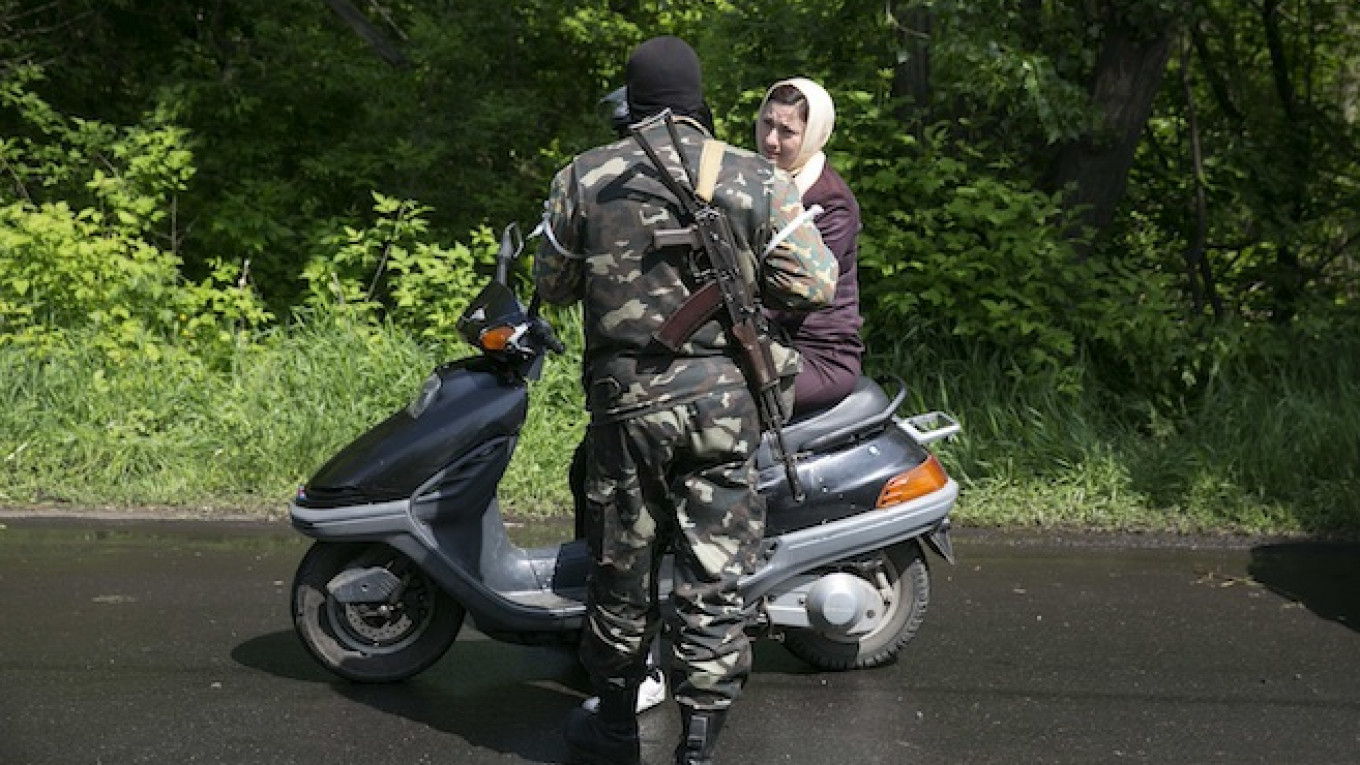The separatist mayor of Slovyansk in eastern Ukraine has said that his people will "call to account" those responsible for economic inequality in the region and will impel foreign governments to recognize the separatist administration, according to an interview published Tuesday.
"There is injustice all around us, with people forcefully divided into rich and poor through fraudulent privatization operations," the self-styled people's mayor of Slovyansk, Vyacheslav Ponomaryov, told Rossiiskaya Gazeta. "In due time, we will call to account everyone who had something to do with it, because they were simply destroying us."
"They did not give us jobs or a living. They only raised prices, filled their pockets, did not think about the people," he was quoted as saying. "Now the time has come to think about the people."
The Bolshevik-style rhetoric of separatists in the industrialized, coal-mining east of Ukraine has drawn criticism from political analysts who have noted that followers of revolutionary leader Vladimir Lenin
tried to create a viable government and a self-sufficient infrastructure after toppling the tsarist regime.
"Even the 1917 revolution in Russia started with decrees, adopted in the first minutes, forming the government, appointing ministers, assigning responsibilities," historian and political analyst Nikolai Zlobin, head of the Washington D.C.-based Center on Global Interests, told Ekho Moskvy radio Monday night.
This type of planning does not appear to have taken place in the separatist republics in eastern Ukraine. Instead, Ponomaryov called Monday for Russian troops to provide stability and peace, and the self-styled Donetsk People's Republic leader Denis Pushilin appealed to Moscow to accept the region as its subject.
"I thought that they would abide by some rules of politeness, would stay a sovereign state for at least a day," Zlobin said. "I read [separatist interviews] and I shuddered. 'We want better pensions, we want better wages.' Well, by all means! Everybody wants bigger pensions, bigger wages. This is no political program of a new administration."
Ponomaryov told Rossiiskaya Gazeta that his allies wanted to develop the region's industrial plants, which have been "nationalized and transferred into the communal property of the city," improve education and health services, and develop a resort — a "Switzerland of the Donetsk region" — in the town of Svyatogorsk, whose main claim to fame is a 19th-century mountain-top monastery.
Ponomaryov was vague on how he planned to finance those ambitious goals. According to government figures cited by Ukraine's business news website InvestGazeta.net, the Donetsk region, where Slovyansk is located, received 9.25 billion hryvnias ($782 million) in net subsidies from the government in Kiev in the first six months of 2013 alone.
Now that the "People's Republic" is independent, its separatist administration presumably cannot expect to continue taking money from the Kiev government, and critics in Ukraine have already suggested that perhaps it was time to cut off the breakaway regions.
"Attempts to place territorial integrity [of Ukraine] above the country's ability to function normally and develop dynamically can put one into a trap," Ukrainian journalist Oleksandr Kramar said in an article on Tyzhden.ua news website earlier this month.
Meanwhile, Russia's Foreign Ministry and the Kremlin have both responded with vague statements calling for "dialogue" between separatists and Kiev, indicating that Moscow may not be in a hurry to shoulder the financial burden either.
Citing the anti-government demonstrations in Kiev that led to the ouster of President Viktor Yanukovych, Ponomaryov also called on Western governments to recognize the legitimacy of the new authorities in Slovyansk.
"[They] recognized the Kiev junta, didn't they?" Ponomaryov was quoted as saying by Rossiiskaya Gazeta. "So they will recognize us, too! Aren't we people here? We are people. We will force them to listen to us."
See also:
Donetsk Separatists Claim 90% Support Independence in Referendum
A Message from The Moscow Times:
Dear readers,
We are facing unprecedented challenges. Russia's Prosecutor General's Office has designated The Moscow Times as an "undesirable" organization, criminalizing our work and putting our staff at risk of prosecution. This follows our earlier unjust labeling as a "foreign agent."
These actions are direct attempts to silence independent journalism in Russia. The authorities claim our work "discredits the decisions of the Russian leadership." We see things differently: we strive to provide accurate, unbiased reporting on Russia.
We, the journalists of The Moscow Times, refuse to be silenced. But to continue our work, we need your help.
Your support, no matter how small, makes a world of difference. If you can, please support us monthly starting from just $2. It's quick to set up, and every contribution makes a significant impact.
By supporting The Moscow Times, you're defending open, independent journalism in the face of repression. Thank you for standing with us.
Remind me later.






